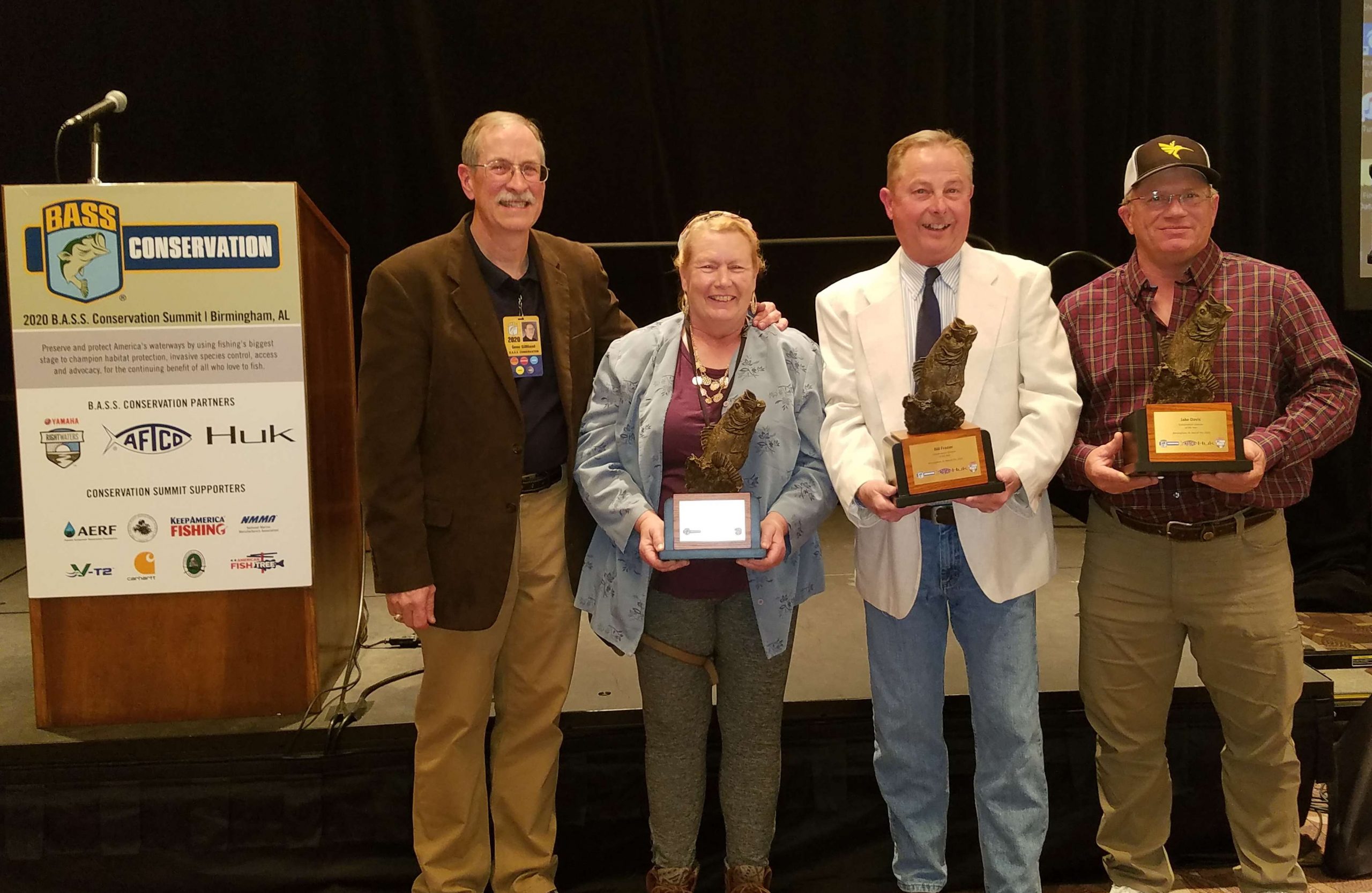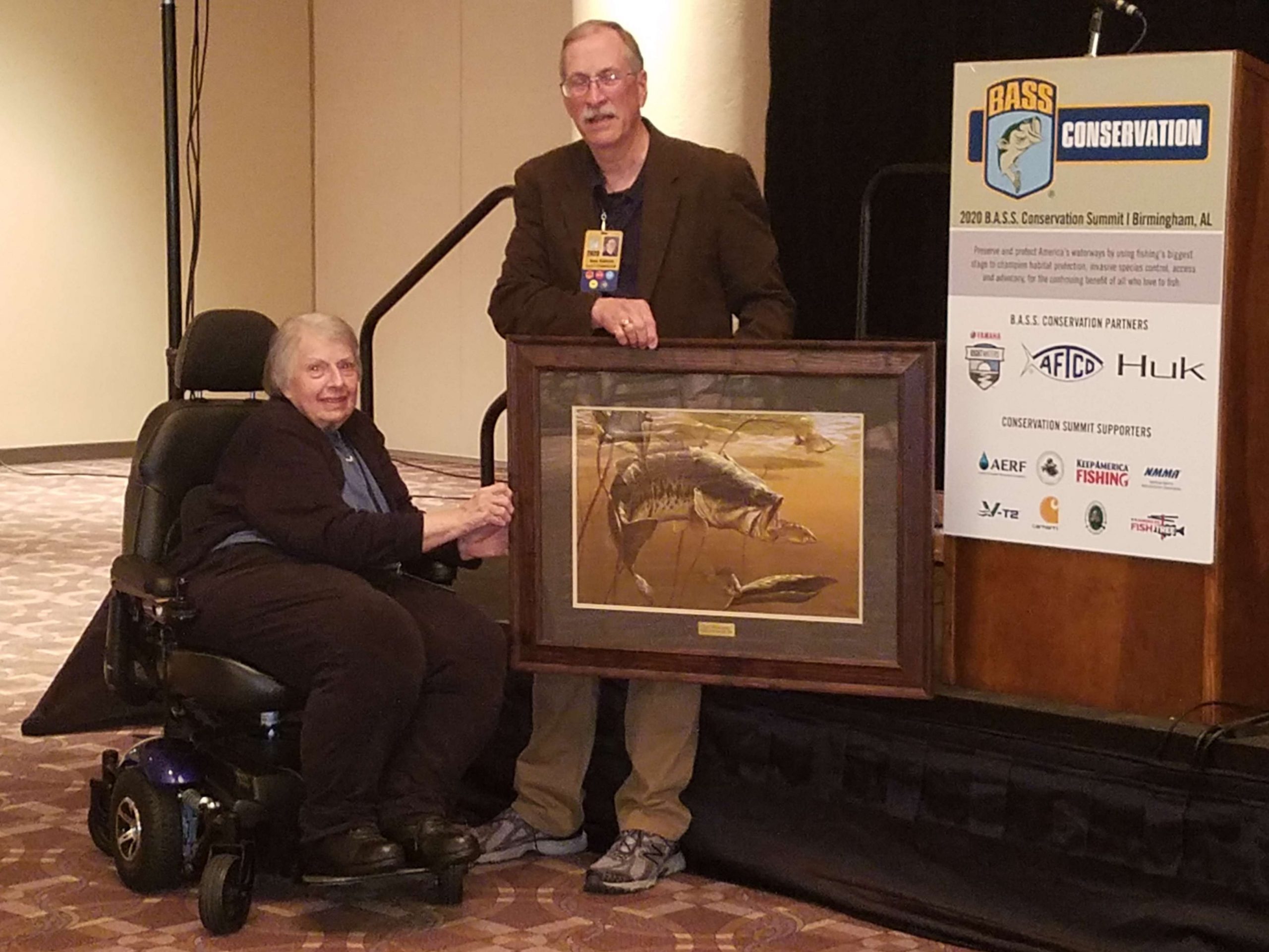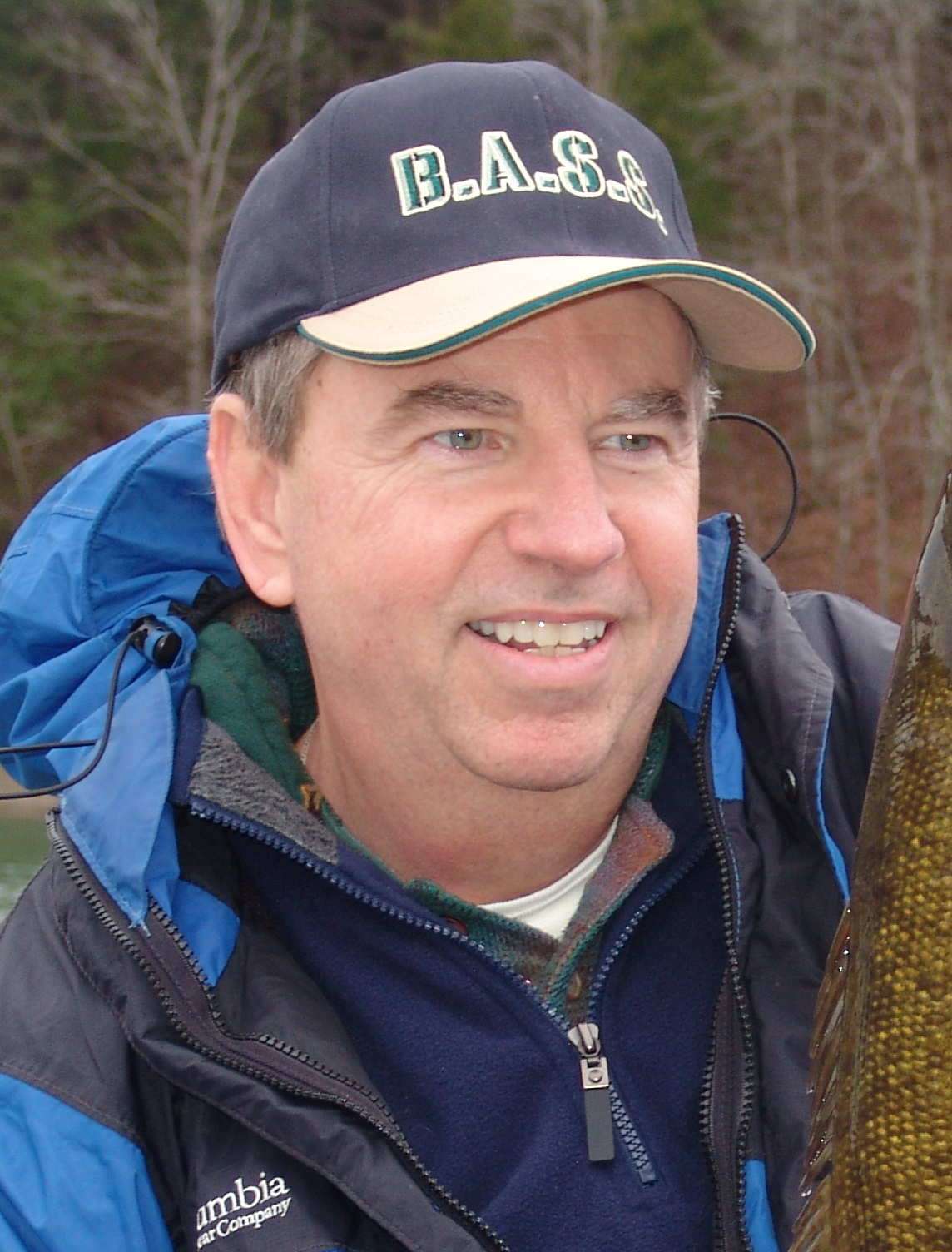
BIRMINGHAM, Ala. — In an unprecedented move, B.A.S.S. Conservation honored three with its highest award March 6-8, at the Conservation Summit held during the 50th Academy Sports and Outdoors Bassmaster Classic presented by Huk.
Barb Elliott of New York, Bill Frazier of North Carolina, and Jake Davis of Tennessee were named Co-Conservation Directors of the Year (CDOY) by National Conservation Director Gene Gilliland. Additionally, during the Saturday night banquet, Virginia’s Joan Blankenship was recognized by B.A.S.S. and Friends of Reservoirs (FOR) for her accomplishments.
“Since we host the Conservation Summit only every other year, I decided to present one for last year, this year, and next year, all at the same time,” Gilliland explained. “I wanted to recognize all three of these people for their great work.
“This is given to the B.A.S.S. Nation conservation director (CD) who has shown leadership to his or her state, region, and/or the B.A.S.S. Nation (BN).”
Tennessee’s Davis said, “Seeing that my actual background is not fisheries or wildlife, it was a great honor for me to stand with two legends as a co-winner. They may not realize it, but both Barb and Bill helped me greatly, both with their knowledge and by reading about their past achievements.”
Elliott, meanwhile, emphasized that she was both “honored and humbled to be included in a group of amazing, accomplished people, including, including Joan Blankenship.
“B.A.S.S. and its Conservation arm do so much” on behalf of fishermen and fisheries, she continued. “I am so proud to be involved in keeping our angling access available for all.”
Frazier pointed out the winners couldn’t have been successful without a team effort from fellow B.A.S.S. members. “No person is talented enough to do this on his own,” he said. “Since we are not funded, much of what we do is on pure initiative. But we feed on each other.”
“I learn from all the others, and I hope they are gaining useful information from me.”
The North Carolina CD emphasized that Davis “keeps me fueled. “He’s really energized Tennessee’s Nation and Youth, and it’s inspiring.”
Compared to Elliott and Frazier, who both have been leading their state’s conservation programs for a dozen years, Davis is a relative newcomer at the CD position, with only 2 1/2 years at the helm. But in recruiting youth to help with cleanup and habitat efforts in his state’s fisheries, the retired military vet and 40-year member of B.A.S.S. quickly has brought the TBN to the forefront for activism.
“One of his biggest passions is working with kids,” Gilliland said. “He gets things done in a lot of places.”
One of his most notable achievements included a collaborative habitat enhancement project on Tims Ford, assisted by funding from an AFTCO/B.A.S.S. Nation Conservation Grant.
“The project was so successful that TWRA (Tennessee Wildlife Resources Agency) decided to commit additional funding toward similar projects, utilizing B.A.S.S. Nation volunteers, high school fishing teams, and other partners,” Gilliland said.
Davis also was recognized by “Keep the Tennessee River Beautiful” for conservation efforts in connection with the Yamaha Rightwaters Ripple Effect Beacon Leadership Award.
New York’s Elliott, meanwhile, has gained both national and international notoriety for her expertise regarding fish care, notably barotrauma and fizzing.
“Barb taught all 75 Bassmaster Elite Series pro anglers how to properly fizz smallmouth bass during three days of training in Waddington (New York),” Gilliland revealed. “That (2019) training resulted in a significant increase in the live release rate of bass compared to 2018 results.”
Elliott gives seminars on fish care and fizzing to groups of anglers at every level, from high school to the pros, in both the U.S. and Canada. She helps on the B.A.S.S. Yamaha/AFTCO Live Release boats during New York tournaments. And she’s been featured in several videos about barotrauma and fizzing, as well as in Kickin’ Bass, a book by B.A.S.S. Senior Writer Robert Montgomery.
As a fundraiser for the New York BN, she makes and sells “fizz” kits, which include needles, reamers, and instructions.
North Carolina’s Frazier, a water quality specialist and educator, also has made a name for himself in terms of fish care. For the past 11 Bassmaster Classics, he’s assisted with safely transporting bass from the weigh-in site back to the fishery.”Bill is the guy hidden under the stage,” Gilliland said. “He volunteers for this duty every year despite cramped and noisy conditions.”
Among his most noteworthy achievements in North Carolina are the creation of “fishing trails” at several bass fisheries. They’re the angling equivalent of golf courses, with each “hole” enhanced with habitat and information provided regarding the preferred season and lures to fish it.
“As a Lowrance Electronics pro-staffer, Bill mapped the lake bottoms and determine the best locations for the structures,” Gilliland explained. “He also does seminars on sonar techniques at local tackle shops and sporting shows.”
Additionally, Frazier is a champion for access issues and an outspoken critic of illegal fish introductions such as the illegal introduction of Alabama bass into North Carolina and Tennessee fisheries.
Finally, Blankenship received the FOR award from the Reservoir Fisheries Habitat Partnership for her ongoing efforts to restore eelgrass to Virginia’s Claytor Lake and, in the process, creating a valuable nursery source for vegetation that can benefit bass fisheries in the entire Mid-Atlantic area.
“I got involved in this a long time ago, and it’s my passion,” said the longtime Virginia CD, who’s acquired grants from AFTCO, Shimano, Aquatic Ecosystem Restoration Foundation and Friends of Reservoirs and partnered with Virginia Tech and others. “You have to stick to it, and it takes a long time to build relationships.”






